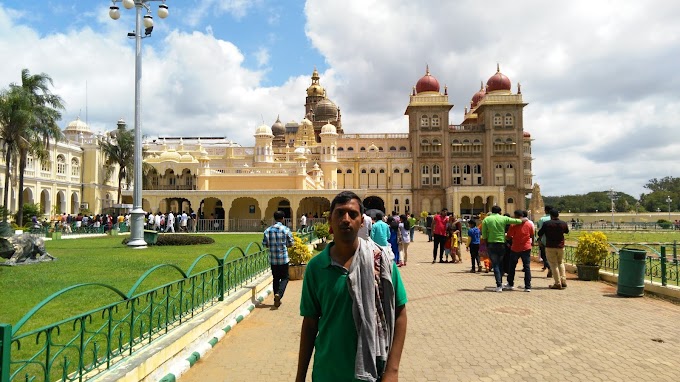Traditional culture
is always the nature friendly:
The ancient civilizations always gave importance to the nature
and respect those things that were connected with nature. It is no doubt that
prior to the religion they had respect towards nature for which the nature gave
them everything’s which are minimum requirements for a human being like food
cloth and shelter.
The first written history stared from the date of first
civilizations which was existed since 7000 years ago. That during said period
the bronze metal was discovered. The source of income was agriculture and
treading. Everybody wanted to do some work cor which those time unemployment was
not there. The society was divided into class and the work also was divided on
the basis of class. The class was also divided into sub-class.
First civilizations was come to existence in 4000 to 3000 BC
which is called as Mesopotamia and Egypt civilizations. But the statue of
Sphinx was constructed prior to the Egypt civilizations where the archeologists
and historian has found the symbol of sun, moon, fir and other which shows that
the human being was worshipped. And the many books which are recorded
about that from Greece and rome , the religion system was started but prior to
that one religion was existed. But they were worshipped the nature as God for
which it was called as hinduism.
The pyramid is the symbol for the integration of self-and soul (
at the spiritual level). In this pyramid, there are the many symbols which were
created by the workers during the construction period. In this pyramid, the
symbol of sun, mood, water animals and many more. They knew that the five
elements fir which they were worshipped those.
Ancient time culture means only to confine food, tradition and
arts & literature. Human civilization was taken food to live. Therefore that
food were natural and no use of chemical. By way of compost which were
generated like cow dung. And the non-veg food were collected from the forest. The
health of the people were normal. The civilization lived with the help of the
nature for which their life span was long and healthy.
The traditional culture is one of the tradition which derived
from their predecessor. Those traditional culture was also help the civilization
to confined their limit. Who ever gone against the nature they face the
consequence and the history is the evidence for that.
The ancient civilization leave their arts & literature which
are still showing the evidence with regard to way of life, tradition and their
culture. At present we are still using those traditional books to solve our
problem like in Medical Science (Charak Sahita), Economic (Arthasastra) and
many more. The ancient civilization destroyed due to attack of outside enemy and
other cause but many books, monuments, they leaved for use. And from those book
we know that the ancient tradition was very familiar with the nature.
In some books it is also indicated that the first sun temple was
constructed prior to the first civilizations. The said temple was constructed
inside Sphinx. From those point of view one can understand that the ancient
civilizations were worshipped the nature.
After the demolition of Indus valley civilizations, the Vedic
period started all over India. During this Vedic period, the people learned why
they should worship the nature and what they would get the benefits. The
people learned that it should not play with nature for example
Fire is the God so
does not play with fire
The reason behind
it is that if someone play with fir he or she will suffer. So it is correct
that to give respect.
Water is the life
of creature so do not worst or don't pollutate it.
The reason behind
is that if the water become pollutated then that can not be used by human or if
any one use she or he may suffer.
During the ancient
times the people were not so educated but they knew the manner, behavior, and
respect to other.
There is a relation between the nature and human being. Human cannot
live long without nature. As per the Hindu tradition, in last session of the
winter, the Hindu people celebrate a festival in the name of “AGI PUNAMI”. In
that day everybody burn the vegetable in the fire and eat those vegetable like
as “PRASAD”. The science behind it is that it is the therapy of some kind of
stomach problem. There are many example is available on which science have no
doubt.
During the ancient period, the human civilize worshiped forest
like as God and protect the forest. The reason behind is that during the
ancient period human fully depend on forest like food, livelihood and most
important the forest provided the medicine which was used for therapy. The
concept of Ayurvedic has derived from ancient period and still have popularity
then Homeopathy and allopathic. But all type of Ayurvedic medicines are not
available and if available but not sufficient to all due to loss of forest. And
the reason behind of loss of forest is human being.
During the modern age and industrial revolution, the climate is
changed and even in Ozone layer or O3 have some crack. The
said crack is the reason behind of climate change. The Industrial Revolution is
the main reason for the development of human civilization to Modernization but
the said reason is also for the main reason for climate change.
Human civilization is now very develop than ancient period and
in same time is adopted the new method of culture. At present due to
globalization, there is no particular culture for a Geographically area. Due to
adoption of multi culture and tradition the familiar with the nature also
lost.
The worship to Mother Earth is a
universal incident in many original cultures. There are countless examples of
festivals, rituals, songs, and myths that dedicates to Mother Earth. The said ceremony helps to become familiar and
the sense of togetherness and harmony that exists between man and nature in
tribal societies.
For the people of India, environmental protection
is not a new concept or ideology. The protection of nature and wildlife was emphasize
the faith, reflected in the daily lives of people, enshrined in myths,
religion, arts, and culture. Some of the fundamental principles of ecology-the
interrelationship and interdependence of all life-were conceptualized in the
Indian.
Indian painting, sculpture,
architectural ornamentation, and the decorative arts is in-complete without
themes from nature and wildlife reflecting love and reverence. A wide range of images of forests, plants, and
animals are to be found in Indian tiny arts, paintings and sculpture. The theme
of the Hindu god Krishna's life depicted in tiny paintings underlines an
appreciation of ecological balance. He is shown persuading people to worship
the mountain in order to ensure rainfall. Krishna swallowing the forest fire
also signifies a concern for the protection of forests and wildlife.
Indian ideology is totally based on
myth and where anyone find the relationship of human and nature. The myth like
Ramayan, Sree Krushna, Mahabharat, Vedic Period all are related to the nature.
If someone love the nature and the nature most love them. Lord Rama lived in
forest 14 years and in that period he knew everything which was required to be
a King. Shree Krishna ideology gives the importance of forest and animals and
the day to day relationship of those.
During the ancient period, the Rishi
who were provided the education to others but they were lived in deep forest
area. Once upon at time (during Vedic period) the Rishi were the protector of
the forest. By way of “HOMO” they created the healthy atmosphere surrounding area.
For which the ecology system was running orderly. The human civilization could
fell the six sessions easily.
Except human civilization, other
animals are living in the Ecology system. Everybody have some duty towards the
cleanness of eco-system like dog, crow,
cat, cow and many more. There is some
duties of human civilization towards everybody including animals, birds and
other creatures. Therefore human society
gives some importance in new way lik Cow is the worshiped as “Go Mata”.
Traditional
societies or traditional culture are mainly referred to the
tribal people who are very familiar with the environmental knowledge through
their everyday experience with nature and natural resources. The deep relationship
between tribal people’s livelihood and nature commonly provides the plants,
animals, water, sunlight, air and soil, where the nature and society are as one
and whole.










